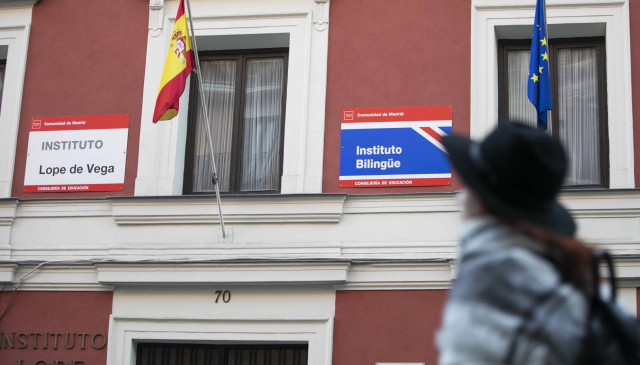 Ukraine reports 5,276 new COVID-19 cases
Ukraine reports 5,276 new COVID-19 cases
 Zelensky: Every third Ukrainian considers road construction one of greatest achievements of 2021
Zelensky: Every third Ukrainian considers road construction one of greatest achievements of 2021
 Ukraine ready to implement Minsk agreements, but Russia's desire needed - Yermak
Ukraine ready to implement Minsk agreements, but Russia's desire needed - Yermak
 Michel: EU unanimously agree to roll over economic sanctions against Russia
Michel: EU unanimously agree to roll over economic sanctions against Russia
 Actions by Ukraine's partners will help prevent worst-case scenario - Zelensky
Actions by Ukraine's partners will help prevent worst-case scenario - Zelensky
 COVID-19 in Ukraine: Health officials confirm 8,899 daily cases as of Dec 17
COVID-19 in Ukraine: Health officials confirm 8,899 daily cases as of Dec 17
 Macron tells Zelensky he declared support for Ukraine in call with Putin
Macron tells Zelensky he declared support for Ukraine in call with Putin
 Zelensky, Scholz discuss gas transit through Ukraine after 2024
Zelensky, Scholz discuss gas transit through Ukraine after 2024
 Ukraine ready for any format of talks with Russia - Zelensky
Ukraine ready for any format of talks with Russia - Zelensky
 Ukraine’s only journalist in Russia facing extremism charges - lawyer
Ukraine’s only journalist in Russia facing extremism charges - lawyer
 PM Shmyhal: First two applications for investment projects worth $96 million filed
PM Shmyhal: First two applications for investment projects worth $96 million filed
 Zelensky, PM of Italy discuss security situation around Ukraine
Zelensky, PM of Italy discuss security situation around Ukraine
 President signs off State Budget 2022
President signs off State Budget 2022
 London considering all options for responding to Russia's aggression against Ukraine
London considering all options for responding to Russia's aggression against Ukraine
 Putin, Biden to hold another round of talks
Putin, Biden to hold another round of talks
 Some 260,000 Ukrainians “victims of human trafficking” over 30 years - prosecutor general
Some 260,000 Ukrainians “victims of human trafficking” over 30 years - prosecutor general
 Ukraine plans to create center to protect energy infrastructure from cyber attacks
Ukraine plans to create center to protect energy infrastructure from cyber attacks
 No clear idea so far when Normandy Four top diplomats set to meet - German Ambassador
No clear idea so far when Normandy Four top diplomats set to meet - German Ambassador
 Ukraine receives EUR 600M in macro-financial assistance from EU
Ukraine receives EUR 600M in macro-financial assistance from EU
 Zelensky holds phone conversation with PM of Israel
Zelensky holds phone conversation with PM of Israel
 Ukraine sets new daily COVID vaccination record
Ukraine sets new daily COVID vaccination record
 MFA: European Union has not yet removed Ukraine from list of safe countries
MFA: European Union has not yet removed Ukraine from list of safe countries
 Kyiv records 1,023 new COVID-19 cases, 29 deaths
Kyiv records 1,023 new COVID-19 cases, 29 deaths
 G7 ambassadors welcome adoption of law on NABU status
G7 ambassadors welcome adoption of law on NABU status
 Ukraine can increase Covid vaccination rates to 1.5M a week – Liashko
Ukraine can increase Covid vaccination rates to 1.5M a week – Liashko
María is a 33-year-old geography and history teacher at a public secondary bilingual school in Madrid. It’s not a position she feels comfortable with. “It doesn’t make me anxious, but I don’t think I’m doing a good job,” says María, who did not want to use her real name. “I use irony and humor to get closer to my students and I can’t do this in English because it is not my native language.”
In 2013, after struggling to find work, María decided to get the certificate in advanced English (C1), which is required to teach English in the region of Madrid. It took two years to prepare for the exam and cost her €3,000 in classes. Since then, she has worked full-time as a substitute teacher.
The boom in public bilingual centers in Spain has been remarkable. In the 2010-2011 period, 240,154 students were studying in a bilingual program in one of Spain’s regions (except Catalonia, which does not provide data). In the 2016-2017 period, that figure had jumped 360% to 1.1 million, according to an EL PAÍS study of data from the Ministry of Education. Some 95% of Spanish students at bilingual schools have chosen to be taught in English.
But experts say there is not enough analysis or objective data on the effect of bilingual learning. They accuse regional governments of using students as a testing ground to meet electoral promises.
“Families are often making misinformed decisions and choose these centers because they are socially prestigious. They set learning expectations that are not realistic,” Rubén Chacón, professor of English language at the National Distance Education University (UNED), said at last week’s Biuned congress, where over 100 national and international experts discussed the issue of bilingual education.
“Bilingualism is here to stay and teaching professionals must adapt and educate themselves to move forward,” he added.
























































































































